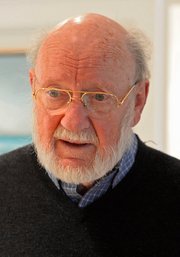Three Scientists Share 2015 Nobel Prize in Physiology or Medicine for Fighting Parasitic Diseases
The Nobel Assembly at Karolinska Institutet has decided to award the 2015 Nobel Prize in Physiology or Medicine to three scientists for their work on parasitic diseases. One half jointly award goes to William C. Campbell and Satoshi Ōmura, for their discoveries of a new drug to treat infections caused by roundworm parasites, and the other half to Youyou Tu for her discoveries concerning a novel therapy against malaria.
"Parasitic diseases affect the world's poorest populations and represent a huge barrier to improving human health and wellbeing," the Nobel Assembly at Karolinska Institutet, which awards the Nobel Prize in physiology or medicine, said Monday.
"These two discoveries have provided humankind with powerful new means to combat these debilitating diseases that affect hundreds of millions of people annually. The consequences in terms of improved human health and reduced suffering are immeasurable."
Hindering the effects of roundworms
Campbell and Omura discovered a new drug, Avermectin, the derivatives of which "have radically lowered the incidence of River Blindness and Lymphatic Filariasis,as well as showing efficacy against an expanding number of other parasitic diseases." the Nobel Assembly explained.
[caption id="attachment_245" align="alignnone" width="180"] Kimimasa Mayama/European Pressphoto Agency[/caption]
Kimimasa Mayama/European Pressphoto Agency[/caption]
Thanks to Campbell and Omura, "Today the Avermectin-derivative Ivermectin is used in all parts of the world that are plagued by parasitic diseases," the Nobel Assembly said.
[caption id="attachment_247" align="alignnone" width="180"] Cj Gunther/European Pressphoto Agency[/caption]
Cj Gunther/European Pressphoto Agency[/caption]
Thanks to Campbell and Omura, "Today the Avermectin-derivative Ivermectin is used in all parts of the world that are plagued by parasitic diseases," the Nobel Assembly said.
"The importance of Ivermectin for improving the health and wellbeing of millions of individuals with River Blindness and Lymphatic Filariasis, primarily in the poorest regions of the world, is immeasurable. Treatment is so successful that these diseases are on the verge of eradication."
The fight against malaria
Malaria is a mosquito-borne infectious disease caused by parasitic protozoans that invade red blood cells, and transmitted by the bite of infected mosquitoes. It can cause symptoms like fever and, in some worse cases, brain damage and death. More than 450,000 people die every year from malaria, the Nobel Assembly said. Many of them are children. And roughly half of the world's population -- 3.4 billion people -- are at risk of contracting malaria.
[caption id="attachment_246" align="alignnone" width="180"] Jin Liwang/Xinhua, via Associated Press[/caption]
Jin Liwang/Xinhua, via Associated Press[/caption]
"Youyou Tu discovered Artemisinin, a drug that has significantly reduced the mortality rates for patients suffering from Malaria. Artemisinin represents a new class of antimalarial agents that rapidly kill the Malaria parasites at an early stage of their development, which explains its unprecedented potency in the treatment of severe Malaria," the assembly said.

Your email address will not be published. Required fields are marked *